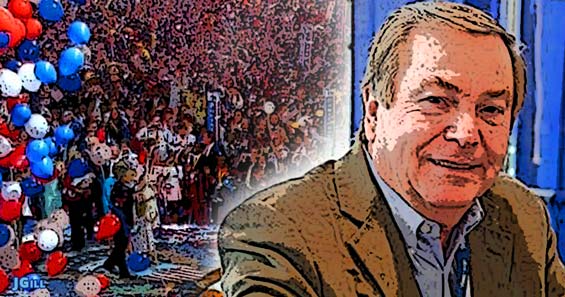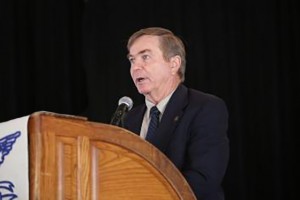
An article last week in Politico described Curly Haugland as a “rule-mongering crank,” a “gadfly,” “stubborn” (twice), a “pain in the ass,” and a “pedantic curmudgeon.”
And that was merely in the first paragraph!
Who is this Curly fellow, you ask? He’s the ultimate authority in the Republican Party, one of the delegates to the Republican National Convention in Cleveland this July.
Back in Bismarck, North Dakota, Haugland built and runs a successful small business. The Politico piece presented him as a “pool supply magnate.” With a broad smile, he’ll tell you that he’s literally sold swimming pools to Eskimos.
Hard-working and successful, Curly believes in the free-enterprise system and despises crony capitalism. And he also wants to give back, to make certain he leaves the country better off, more free and full of opportunity, than he found it. That’s why Haugland got involved in the GOP to begin with, and why he now serves on the Republican National Committee, and even more importantly, as a no-nonsense member of the party’s Rules Committee.
Long before Trump was an issue in the party (or even actually “in” the party), Mr. Haugland was urging Republican leaders to do something anathema to the Washington-insider-types: Follow the rules.
“The rule says, specifically,” Curly told CNBC hosts back in March, “that it’s a vote of the delegates at the convention to determine if there’s a majority, not a primary vote. . . . The media has created a perception that the voters will decide the nomination. Political parties choose their nominee, not the general public.”
Now, before burning Curly in effigy — or otherwise — for not being “democratic enough,” remember that the entire electorate does indeed get to choose the president, though on a state by state basis, through the Electoral College. What is at issue here is who chooses the nominee of the Republican Party.
Is it primary voters, as the media has been saying, with RNC Chair Reince Priebus nodding along, or the delegates, as Curly Haugland contends?
Historically, Republican Party delegates have been free to vote their conscience, from just prior to the Civil War, when Lincoln gained the nomination at a contested 1860 convention, until today. It’s been a rule. The only exception was in 1976, when President Ford’s campaign worked to change the rule, binding delegates to block Ronald Reagan’s insurgent candidacy. Coincidentally, the leader of that ’76 effort was Paul Manafort, who today is running Trump’s convention effort.
Haugland’s point is clear: delegates in Cleveland are by rule unbound. And not just on the second or third ballot, but on the very first ballot.
That is, unless the rules are changed.
What sayest the RNC in Washington?
“And yet, incredibly, Republicans at the highest level can’t quite dismiss Haugland’s arguments,” Erick Trickey wrote in Politico. “Even last week, three days after Reince Priebus declared Trump the presumptive nominee, the party chairman couldn’t quite bring himself to dismiss the possibility that the convention could nominate someone other than Trump.”
Should delegates in Cleveland decide to vote their conscience, they are very unlikely to nominate Donald. J. Trump. At which point, Mr. Trump would undoubtedly decry this “rigging” of the nomination process and the “stealing” of his primary vote mandate. But who is rigging what?
I’m a big fan of democracy — not pure democracy as a form of government, of course, but voting as a wonderful mechanism to control our government, and therefore, to protect our rights, our republic. People’s votes should be respected, not ignored.
Yet, democracy isn’t served by a New Yorker deciding a political contest in Texas or a Republican (remember Operation Chaos?) deciding who the Democrats nominate, or vice-versa. We have a right to vote on who serves in public office, but not a right to decide who is nominated by a political party to which we do not belong.
“Without borders,” Mr. Trump has argued, “we don’t have a country.” To which a Republican friend recently added, “Without borders, we don’t have a party.”
Curly Haugland has been transparently making the same point for years: political parties are private associations free to set their own rules, which seems self-evidently fair. But whatever nomination process chosen, the party should follow the rules.
That’s Curly’s “pain in ass” point.
Sure, a party might be wise to hold primaries to nominate, including the broader public, if they most of all want to win, or through state conventions reserved only to party members, if their first concern is commitment to a set of principles. Or any number of ways. But by the rules.
Curly Haugland’s beef isn’t with Trump, though; it’s with the media and the RNC leadership, for not telling folks the truth.
No telling if GOP delegates will vote their conscience in Cleveland, but thank you, Mr. Haugland, for speaking truth to power and powerful media. Republican delegates may be listening.
Paul Jacob, May 15, 2016
This column first appeared at Townhall.com.
